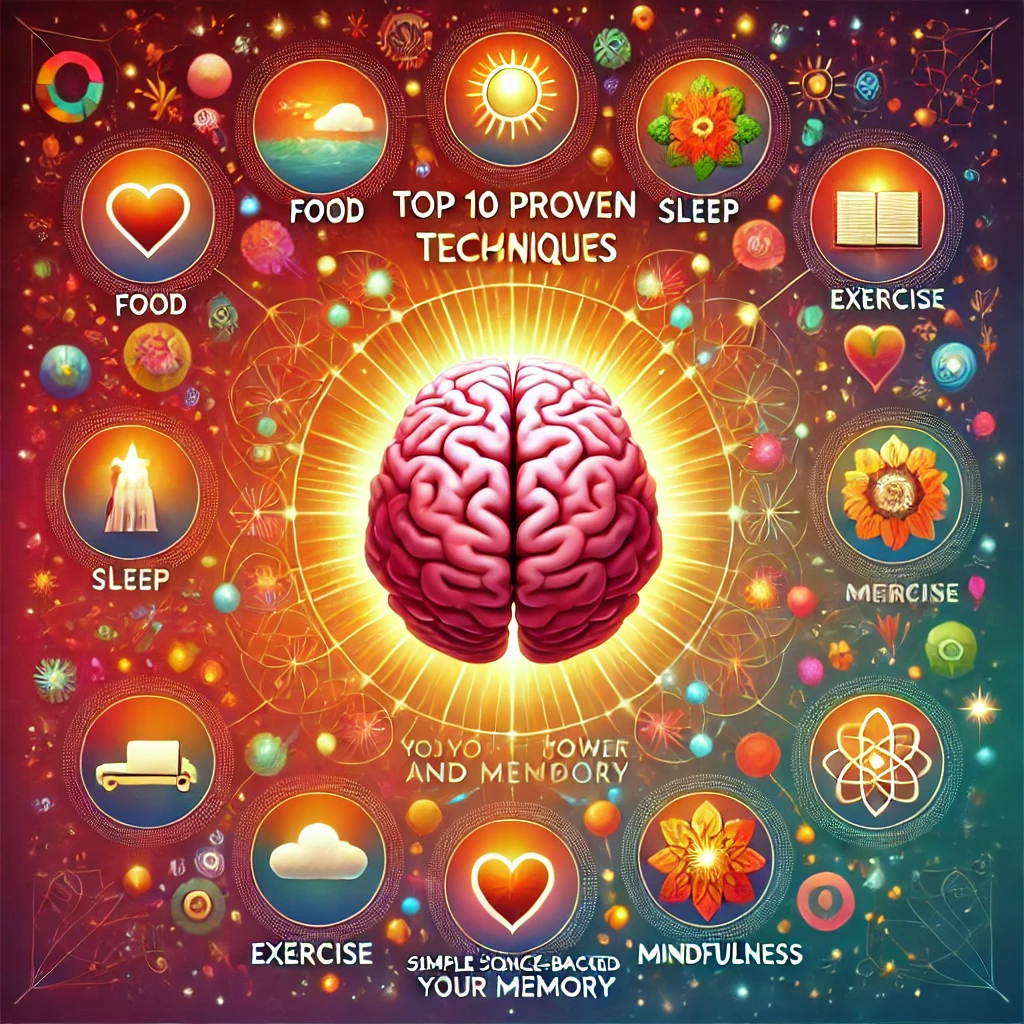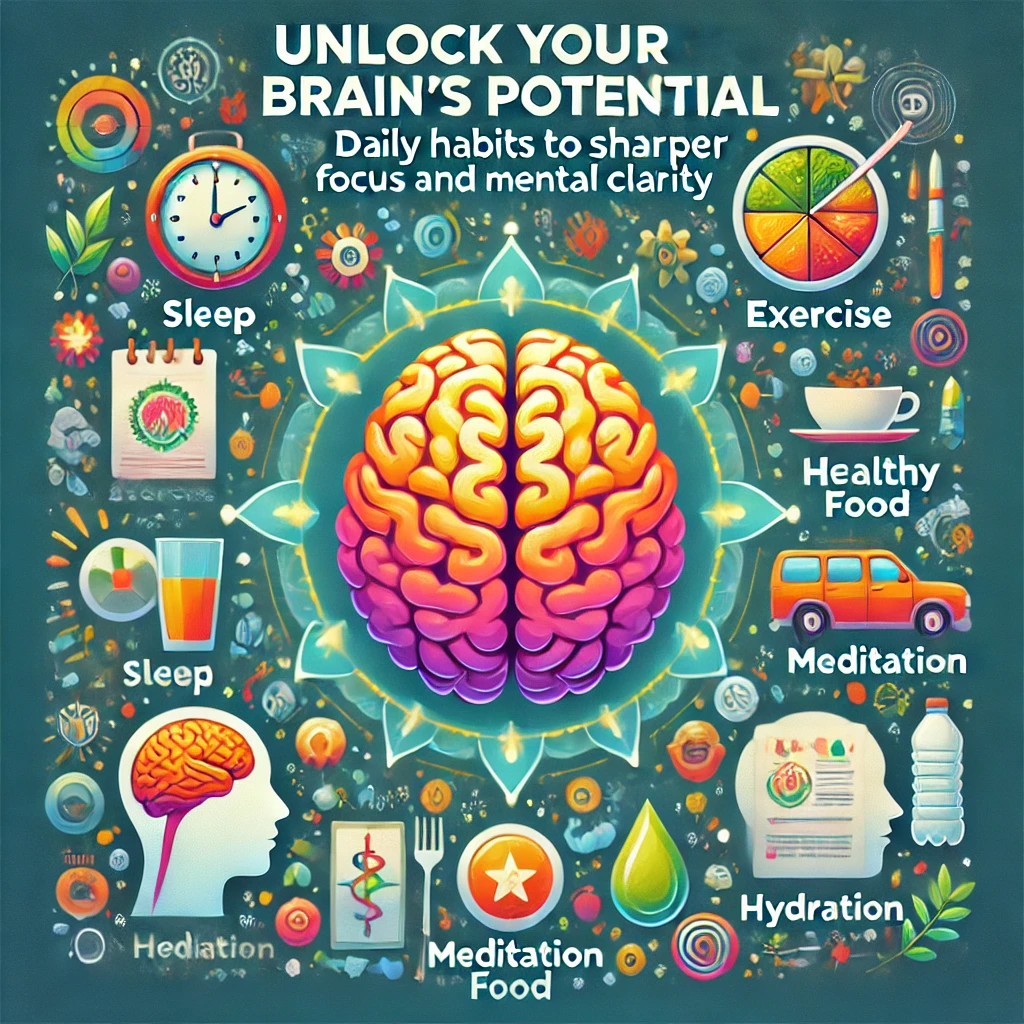Introduction
Ever found yourself forgetting where you put your keys? Or maybe you walked into a room, only to completely blank on why you’re there? We’ve all been there, but the good news is that your brain has a remarkable capacity to grow, adapt, and improve with the right care and techniques. Whether you’re a student looking to ace your exams, a professional wanting to stay sharp, or simply aiming to keep your mind sharp as you age, these techniques will help boost brain power and memory naturally.
Let’s dive into the top 10 science-backed techniques to elevate your brain health and memory.
1. Get Enough Quality Sleep
It’s no secret that sleep is crucial for brain health, but did you know it’s one of the most powerful memory improvement tips? When you sleep, your brain consolidates memories, repairs itself, and processes information from the day.
Relatable anecdote:
Think of sleep like a janitor in a library at night, putting books back on the shelves. If the janitor doesn’t show up, the library’s a mess. The same goes for your brain! Without enough sleep, it’s harder to access those “books” (memories) when you need them.
Quick tips:
- Aim for 7-9 hours of quality sleep each night.
- Create a relaxing bedtime routine to signal to your brain that it’s time to wind down.
- Avoid screens and heavy meals an hour before bedtime.
2. Feed Your Brain with a Healthy Diet
Food has a profound impact on cognitive function. Omega-3 fatty acids, antioxidants, and vitamins like B6, B12, and folic acid are brain-boosting nutrients that help maintain and protect brain cells.
Example:
Think of foods like blueberries and walnuts as fuel for a high-performance car. Your brain, just like the car, runs better with quality fuel.
Brain-boosting foods:
- Fatty fish (like salmon) for omega-3s
- Blueberries, rich in antioxidants
- Leafy greens, high in vitamins B6 and B12
- Walnuts and almonds for healthy fats
Bonus tip: Drinking plenty of water is also essential for cognitive performance. Even mild dehydration can impair memory and focus.
3. Exercise Regularly
Physical exercise isn’t just for muscles; it’s one of the best ways to improve memory naturally and boost brain power. Exercise increases blood flow to the brain, which encourages the growth of new brain cells and enhances overall cognitive function.
Relatable anecdote:
Imagine your brain is like a houseplant. It needs water, sunlight, and nutrients. Exercise is like watering and giving sunlight to the plant, helping it grow strong and healthy.
Try this:
- Aim for at least 150 minutes of moderate exercise weekly.
- Mix it up! Aerobic exercises like running, swimming, or even a brisk walk can do wonders for your brain.
4. Practice Mindfulness Meditation
Meditation is a powerful tool for mental focus exercises and memory enhancement. Research shows that mindfulness meditation can increase grey matter in the brain, particularly in areas responsible for memory, emotion regulation, and learning.
Example:
Think of meditation as a way to clear out the mental “clutter” in your brain, giving you more room for important memories and ideas.
How to get started:
- Set aside 5-10 minutes daily to focus on your breath or use a guided meditation app.
- Gradually increase your meditation time as it becomes a habit.
5. Challenge Your Brain with Mental Exercises
Just like muscles, your brain needs regular stimulation to stay sharp. Puzzles, riddles, and games that require problem-solving can help increase cognitive function and memory.
Relatable anecdote:
Remember when you learned to ride a bike or play an instrument? It was challenging at first, but the more you practiced, the easier it became. The same goes for mental exercises—they keep your brain agile and ready to tackle new challenges.
Mental focus exercises to try:
- Crossword puzzles
- Sudoku
- Chess or strategy games
- Brain-training apps like Lumosity or Peak
6. Learn Something New
Learning a new skill is one of the best techniques to improve memory and brain power. Whether it’s picking up a new language, cooking a complex recipe, or learning to play an instrument, new skills force your brain to adapt and grow.
Example:
Imagine your brain like a network of roads. Learning something new is like paving a fresh road, creating new neural pathways that enhance your overall brain connectivity.
Ideas to try:
- Take a class or online course
- Practice a musical instrument
- Learn to cook a new cuisine
- Start a new hobby like knitting, painting, or gardening
7. Stay Socially Engaged
Socializing isn’t just good for your mood; it’s a great way to boost brain power. Engaging in meaningful conversations stimulates memory and cognitive function, helping to keep your brain active.
Relatable anecdote:
Think of conversations like a workout for your brain. Just as lifting weights strengthens your muscles, talking to people exercises your memory, attention, and problem-solving skills.
Ways to stay socially active:
- Make a habit of calling or meeting a friend weekly.
- Join a club or group with a shared interest.
- Volunteer or get involved in community activities.
8. Practice Visualization Techniques
Visualization exercises can strengthen your memory by associating mental images with the information you want to retain. This technique is especially helpful for remembering lists, dates, or details.
Example:
Imagine you’re trying to remember a shopping list. Instead of memorizing the list verbatim, visualize yourself walking through the grocery store, seeing each item on the shelf.
Try this technique:
- When learning something new, try to visualize it in a detailed, memorable way.
- Create mental “maps” of information you need to remember, like to-do lists or steps in a process.
9. Limit Multitasking and Practice Focused Attention
We live in a world that demands multitasking, but dividing your attention makes it harder to retain information. Practicing focused attention helps your brain process information more deeply, leading to better memory and cognitive function.
Relatable anecdote:
Think of multitasking as trying to read multiple books at the same time. You’ll barely remember the details because you weren’t fully engaged with any one book.
Quick tips:
- Try the Pomodoro Technique: Focus for 25 minutes, then take a 5-minute break.
- Set aside specific times for checking messages and emails instead of doing it throughout the day.
- Work on single tasks in time blocks, putting distractions aside.
10. Use Memory Aids and Mnemonics
Memory aids, like acronyms, rhymes, and chunking information, can improve memory retention. This technique is particularly effective for learning lists, facts, or sequences.
Example:
Think back to school when you might have used “PEMDAS” (Parentheses, Exponents, Multiplication, Division, Addition, Subtraction) to remember the order of operations in math. That’s a mnemonic!
Ways to use memory aids:
- Use acronyms or abbreviations to remember lists.
- Try rhyming or chunking information into smaller parts.
- Create a story or image that connects each item you need to remember.
Conclusion
Incorporating these techniques into your daily life can have a lasting impact on your brain health and memory. Remember, just like physical fitness, brain fitness takes time and consistency. Try adding one or two of these brain-boosting techniques each week, and soon you’ll notice improvements in your memory, focus, and overall mental agility.
Boosting your brain power and improving memory naturally isn’t a quick fix, but with dedication, these strategies can make a world of difference. So, take that walk, have a blueberry smoothie, meditate, and keep those mental muscles working! Your brain will thank you for it.
Frequently Asked Questions (FAQ)
1. What are the best foods to eat to boost brain power?
Foods rich in omega-3 fatty acids, antioxidants, and vitamins are excellent for brain health. Try adding fatty fish, blueberries, leafy greens, nuts, and seeds to your diet for maximum benefits.
2. How much sleep do I need to improve memory and brain function?
Most adults need 7-9 hours of quality sleep per night to maintain optimal brain health and memory. Sleep plays a crucial role in consolidating memories and processing information.
3. Can exercise really help improve memory?
Yes, regular exercise increases blood flow to the brain, promotes the growth of new brain cells, and improves overall cognitive function. Activities like brisk walking, jogging, and strength training are all beneficial.
4. How does meditation benefit the brain?
Meditation has been shown to increase grey matter, reduce stress, and improve areas of the brain related to memory and learning. It’s a simple yet powerful way to boost brain power naturally.
5. Are brain games effective in improving memory and cognitive function?
Yes, brain games like puzzles, crosswords, and strategy games can help keep your mind sharp by strengthening neural connections. However, combining them with other activities, like learning new skills, can be even more effective.
6. What is neuroplasticity, and how does it help with brain health?
Neuroplasticity is the brain’s ability to reorganize itself by forming new neural connections. Learning new skills, challenging yourself, and practicing mental exercises can enhance neuroplasticity, improving memory and brain power.
7. How can I improve my memory naturally without supplements?
You can improve memory naturally by following a balanced diet, exercising, meditating, getting quality sleep, staying socially engaged, and using memory techniques like visualization and mnemonics.
8. Is multitasking bad for brain health?
Yes, multitasking can overload your brain, leading to decreased focus and memory retention. Practicing focused attention and working on one task at a time can improve both memory and cognitive performance.
9. How long does it take to see improvement in memory and brain power?
The timeline for noticeable improvements varies, but most people experience benefits within a few weeks of consistent practice. Establishing long-term habits around sleep, diet, exercise, and mental exercises will yield the best results over time.



